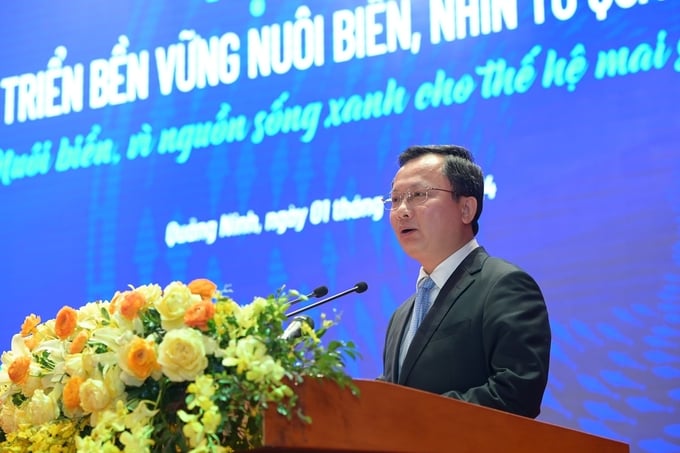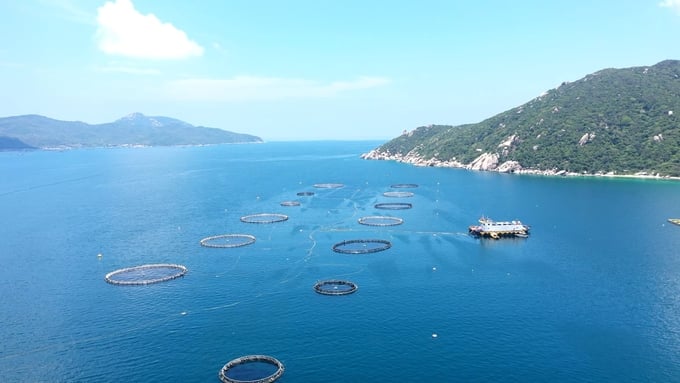May 20, 2025 | 01:34 GMT +7
May 20, 2025 | 01:34 GMT +7
Hotline: 0913.378.918
May 20, 2025 | 01:34 GMT +7
Hotline: 0913.378.918

Overhead view of the Sustainable Mariculture Development Conference - Insights from Quang Ninh on April 1. Photo: Tung Dinh.
In commemoration of the 65th anniversary of Vietnam's fisheries sector and the day President Ho Chi Minh visited and encouraged fishermen in Cat Ba district and Tuan Chau island, Ha Long city, a series of of activities was held over the course of two days (March 31 - April 1) in Quang Ninh province. Leaders from the Ministry of Agriculture and Rural Development and coastal provinces, coordinated with businesses, fisheries cooperatives, and the local community of Quang Ninh province to promote the spirit of "a green and sustainable marine environment with diverse aquaculture resources." The Sustainable Mariculture Development Conference - Insights from Quang Ninh on the morning of April 1 saw numerous constructive exchanges, demonstrating a visionary outlook for Vietnam's aquaculture industry.
Following the discussion session on "Potential and Challenges of Mariculture," and the speeches of domestic and international high-level managers and scientists, Chairman of the Quang Ninh Provincial People's Committee Cao Tuong Huy, affirmed: "With support from the Ministry of Agriculture and Rural Development, Quang Ninh province is determined to become the center for mariculture of Northern Vietnam, as outlined in Decision No. 1664/QD-TTg on mariculture, approved by the Prime Minister on October 4, 2021."

Mr. Cao Tuong Huy, Chairman of the Quang Ninh Provincial People's Committee, delivering a speech at the conference. Photo: Tung Dinh.
Subsequently, chairman Cao Tuong Huy outlined 6 key tasks for the Quang Ninh Provincial People's Committee to direct and implement immediately after the conclusion of the Sustainable Mariculture Development Conference.
Firstly, implement synchronized and effective development of mariculture in Quang Ninh province, with a focus on the national targets for aquaculture development. In addition to developing into a major mariculture and fisheries center, Quang Ninh must maintain its stance on the logical utilization of mariculture resources; maintain a balance between mariculture and the development of landscape and cultural tourism; industrialize mariculture with advanced technology, comprehensive planning, modern management methods; safely and scientifically manage cage aquaculture in accordance with provincial master plans.
Secondly, the Quang Ninh province's agriculture and rural development sector, as well as its coastal regions' government, should effectively manage and sustainably exploit 45,000 hectares of planned coastal areas; enhance the quality of human resources in the fisheries sector; promote the transformation of the labor structure; foster employment opportunities, and stable income improvement for local workers.
Thirdly, reinforce market development, with mid-term and annual production plans to meet supply and market demand.
Fourthly, social policy banks, agricultural banks, in coordination with the agriculture and rural development sector, should enhance credit mechanisms and policies to provide stable investment capital for mariculture development; collaborate with natural resources and environment sectors to simplify administrative procedures in environmental impact assessment, and mariculture area allocation.

Cooperatives and individual mariculture households need to establish effective linkages to enhance the quality of aquatic products. Photo: Duy Hoc.
Fifthly, businesses, cooperatives, and independent mariculture households, which have been licensed and assigned marine areas for mariculture by the government, are recommended to organize production linkages, thereby optimizing investment efficiency and improving the quality of aquatic products.
Fourthly, effectively implement the Provincial Key Agricultural Product Value Chain for the fisheries sector in 2024. Establish a linkage chain between the production, processing, and consumption of aquatic products. Consequently, form a modern aquaculture production-logistics system in the province in association with the national export system.
Chairman of the Quang Ninh Provincial People's Committee Cao Tuong Huy, expressed appreciation towards the leaders of the Ministry of Agriculture and Rural Development, ambassadors of various countries, leading aquaculture experts, the business community, and investors for attending the Sustainable Mariculture Development Conference - Insights from Quang Ninh; whose contributions help shape the future of mariculture in Vietnam.
During the conference, Mr. Nguyen Minh Son, General Director of the Quang Ninh province's Department of Agriculture and Rural Development, granted mariculture licenses and allocated marine areas to representatives from Trung Nam Cooperative, Manh Duc Aquatic Products Trading and Services Cooperative, Thang Loi Aquaculture Cooperative, Bao Anh Aquaculture Development and Services Cooperative, Trong Vinh Aquaculture and Trading Cooperative, and STP Aqua Joint Stock Company. Accordingly, administrative procedures related to mariculture licenses have been streamlined and simplified under the guidance of Quang Ninh province.
Translated by Nguyen Hai Long
![Reducing emissions from rice fields: [Part 1] Farming clean rice together](https://t.ex-cdn.com/nongnghiepmoitruong.vn/608w/files/news/2025/05/05/z6509661417740_a647202949c539012a959e841c03e1d3-nongnghiep-143611.jpg)
(VAN) Growing clean rice helps reduce environmental pollution while increasing income, allowing farmers to feel secure in production and remain committed to their fields for the long term.
/2025/05/19/5136-1-144800_230.jpg)
(VAN) The Nghe An Provincial People's Committee has just approved the list of beneficiaries eligible for revenue from the Emission Reductions Payment Agreement (ERPA) in the North Central region for the year 2025.

(VAN) 14 out of 35 domesticated elephants in Dak Lak province have had their living conditions improved, with 11 of them currently participating in the non-riding elephant tourism model.

(VAN) Muong Nhe Nature Reserve hopes that being upgraded to a national park will lay the foundation for forest protection efforts to be carried out in a systematic, modern, and sustainable manner.
/2025/05/16/3923-2-171845_52.jpg)
(VAN) Lower costs, higher yields, and improved soil quality are outstanding benefits that soybeans bring when integrated into the crop rotation system.

(VAN) The 'For a Green National Environment' programme aims to promote a green lifestyle, support businesses in implementing ESG practices, and turn Net Zero commitments into concrete actions.

(VAN) Cold-barn systems efficiently manage environmental and temperature conditions, which aids in the prevention of respiratory diseases in pigs and protects them from the vectors that transmit African swine fevers.